
Mitski - The Under the Radar Cover Story
The Searcher
Jun 28, 2019
Photography by Koury Angelo (for Under the Radar)
Issue #65 - Mitski and boygenius
![]()
Mitski Miyawaki stands motionless as the music starts, her arms at her sides, hands open and arched outward with palms facing down as if she’s about to levitate. The drums and keyboards of “Nobody”-the disco-tinged single from her latest album, Be the Cowboy—start to percolate. This is a genuine dance anthem, full of defiant self-pity and longing, but she does not so much as shift her balance from her knee-locked pose. As the music swells her voice gains in intensity, her hands begin rising slowly, first in front of her as if bracing for impact, then rising even more as if pleading. As she repeats the song’s title over and over as the music fades, her hands cover her eyes, palms facing outward. In this instant, surrounded by her bandmates and an audience that roars in approval once the last note ends, she is as alone as the character in her song.
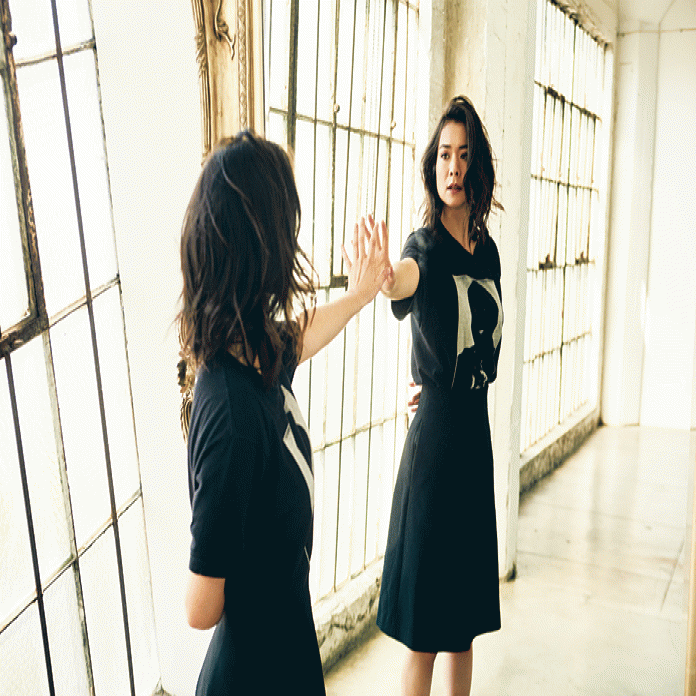
It’s December 21, a few weeks after she completed a sold out fall tour, including four consecutive nights at Brooklyn Steel, and Mitski is the musical guest on Jimmy Kimmel Live! Before the night is over, she’ll play one more song, the achingly somber “Two Slow Dancers,” and the crowd will roar again. This is her moment—selling out 1,800-capacity rooms, profiles in GQ, an interview on The Daily Show—and it all would have been more or less unthinkable even a year ago, back when she was best known for clever tweets and “Your Best American Girl,” the roaring single from 2016’s Puberty 2. Perhaps it’s appropriate that in an era defined by macro debates over political and cultural divisions that a 28-year-old who hails from nowhere and everywhere has managed to capture the zeitgeist—at least part of it-by making music that focuses on the micro of the individual. Finishing up her year in front of a national television audience is a fitting conclusion, one that many artists would use for a moment of reflection, but Mitski is no such artist. She’s too busy thinking about what comes next.
“I’ve been talking about it obsessively with most of my friends,” she admits during a rare day off. “Because the natural progression starts feeling like, ‘Bigger venues, more records sold, more press, more accolades.’ And I’m at a point where I’ve been very lucky that I can make a normal, non-musician working person’s living from music, and I have to think about what will be enough now. What is the point of me doing this now that I can make a living and do what I want? Because it doesn’t feel like making more money is the point to me. So I think, ‘Do I want more accolades? Do I want more people to know me?’” she says with a sigh. “‘Where should I go now?’ is kind of the question.”
If Mitski finds herself at a crossroads, she has no one to blame but herself. Be the Cowboy is the kind of album that seems designed for this moment of millennial angst, a lean 32-minute set of songs that expands her sonic and emotional palette into surgically precise rockers, soaring synth-pop ballads, and conflicted love songs that fit no particular genre designation. Where Puberty 2 was a deeply personal set of songs that resonated, at least in part, because they touched on the universal frustrations of adolescence, Be the Cowboy is an album of distinctly adult anxieties. In truth, Mitski couldn’t have repeated the Puberty 2 formula if she wanted; years of living on the road had made autobiographical writing an unpalatable option. For Be the Cowboy, she channeled her creative energy into narrative, building a character around the most relatable aspect of her now mostly unrelatable life.
“I think the theme that I unfortunately saw—unfortunately for me—was the theme of loneliness or the idea of being alone,” she says. “And the idea of being alone, not because the world is forcing you to be alone but because you are the person causing your aloneness. I mean, I say the word ‘lonely’ so much on this album. It’s so literal. And then I just started thinking, ‘Who is this person who keeps writing about loneliness? Who is the exaggerated form of this person?’ And I came up with the idea of the Hitchcock blonde heroine who is mysterious and unravels throughout the film. Or the main character of the film The Piano Teacher. I just started thinking about these female solitary figures who might be repressed or might be creating a wall around herself. It’s a very muddled, unclear process, but I think that’s how it all came together.”
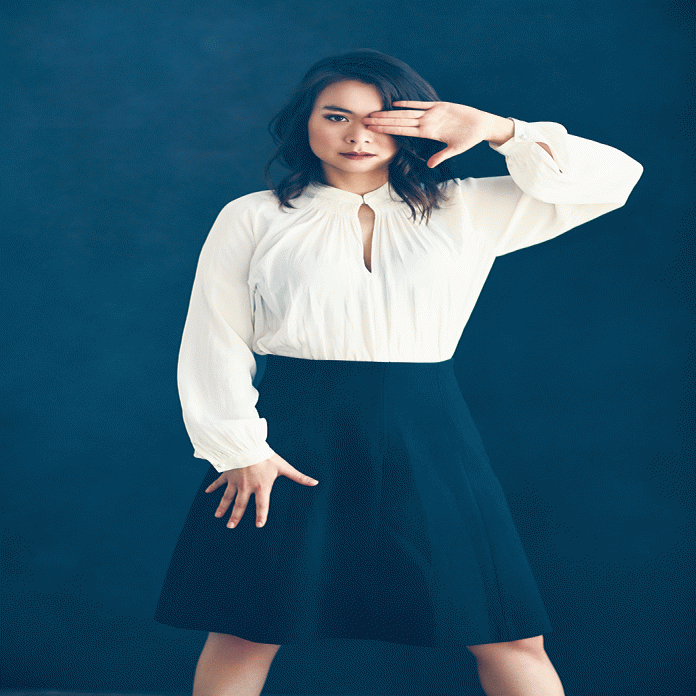
That is to say that Mitski both is and isn’t the character on Be the Cowboy, and figuring out the correct proportion of each is irrelevant. And while Mitski asserts that she doesn’t like to think of herself as a business person, she acknowledges that her decision to write from an outside perspective was partly to make the work more easily digestible, so there could be “some unifying theme in order for people to gravitate towards it and immediately be able to digest it,” she says. The album needed a face, but she was adamant that it wouldn’t be hers.
“I used to not think about it,” she admits “And then people started to listen to my music, and people would come to my shows and talk to me about me,” she laughs. “And that’s when I started to realize, ‘Oh, this is an expression of myself.’ It’s weird to say that out loud, because I never thought of it that way. I always thought I was making songs because I needed to for myself; it was just something I did. Maybe I was just being naïve, but I never thought of it as introducing myself or making people see me.”
A certain mythology has grown up around Be the Cowboy that appears to be at odds with how Mitski has imagined its central character. Perhaps based on some early interviews where Mitski described her creation as someone who adopts the persona of the stereotypical American cowboy—the cocksure, unapologetic archetype who swaggers into a room with total confidence—the album has been celebrated in some corners as a statement of empowerment. At her concert dates, fans have even started to dress in cowboy gear to celebrate this defiant, self-aware character. But, as with everything Mitski does, nothing is quite that simple.
“I think the character of the album is less a cowboy and more someone desperately trying to be a cowboy character and not being able to,” she says. “I’m imagining, in an incredibly pitiful comedic way, someone who is obviously not okay, just red eyes, tears streaming down her face, but being like, ‘I am a fucking cowboy, so help me God.’ Just the ridiculousness of this woman who doesn’t look like a cowboy dressed up like one and being like, ‘I’m a goddam cowboy.’ It’s funny to me. It’s funny in a really pitiful way, that idea.”
The confusion over the character is understandable, if only because the writing on the album is richer and more nuanced—more open to interpretation—than that found on her previous releases. Where she previously wrote from the perspective of someone who wanted to express her sadness and anger to her audience, the character on Be the Cowboy hides behind a shield of false self-awareness, oblivious that those emotions are leaking out nonetheless.
“I think this is my saddest album,” she says flatly. “I think there is in my previous albums a very useful romanticization or glorification of a sadness, and there’s glory in it and something incredibly brave and beautiful about my sadness. Or that’s how I portray my sadness in my previous albums, wherein Be the Cowboy, there’s a realization that no one gives a shit that you’re sad, and you’re still sad. Your sadness is no longer profound, and you’re still sad. It’s that kind of growing up and realizing that it’s not cool anymore to be sad, but you’re still sad.”
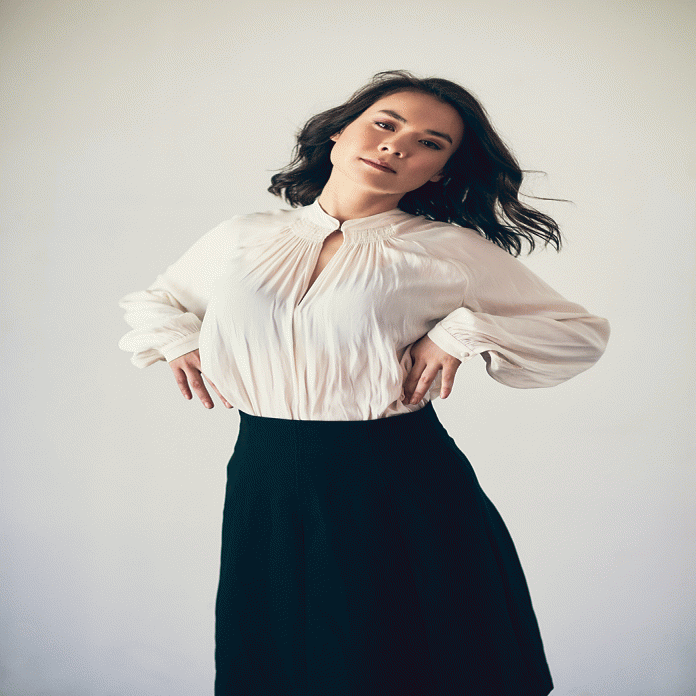
This sadness is all very deliberately contrasted with tones and textures of the music itself, much of which is designed to accentuate the character’s emotional instability by cloaking self-deluded lyrics in superficially upbeat arrangements. Many phrases repeat over and over, she says, in order to capture the obsessive, ruminative quality of the character’s thought process, from the recitations of “I love you” on “Pink in the Night” to the pleads of “Why not me?” on “Washing Machine Heart.” The desperation and longing that has defined her work remains, but the difference between the albums is as profound as the heart-on-sleeve insecurity of late adolescence and the repressed insecurities of adulthood. When the mask slips, what is revealed is more discomforting than anything found on her previous albums.
“This whole album just stinks of denial, because the music itself, a lot of it is poppy and peppy,” she explains. “A lot of it is very clean sounding, but if you listen to the lyrics it’s horrible. Just the idea of someone having this incredible sadness but putting it in a tight little box, putting a ribbon on it, and carrying it around like it’s a beautiful gift. Sometimes you might pass this person and catch a whiff of the stench of the stuff inside the little box. But it’s very neatly prepared, like, ‘I’m completely okay. I am a cowboy. I’m confident,’” she says, as if momentarily inhabiting the character. “‘I’m riding into the sunset as we speak.’”
In Love with the War
Mitski does not like to talk about her early life, which is unfortunate because nearly everything written about her to this point is framed by some examination of her unusual childhood. For the uninitiated, the story goes something like this: born in Japan, the oldest daughter of a Japanese mother and an American father, she and her family relocated every year or so, from Turkey to Malaysia to the Democratic Republic of Congo—13 moves in total by the time she finished high school. As a result, her social life never stabilized, and she became tangled in a cycle of making and losing friends, over and over. There were benefits to this instability: as someone who was not entirely American, not entirely Japanese, not entirely anything—she had the opportunity to essentially workshop new identities with every new start. She would adopt the role of the popular girl one year, then the brainy one the next, leaving each behind when she’d move on to her next stop. And as someone who was never in one place long enough to have a home or culture with which to identify, she retreated into the world of Top 40 pop music and pieced together a cultural homeland of her own, creating a passport she could take with her wherever she went. Still, songwriting was almost an afterthought.
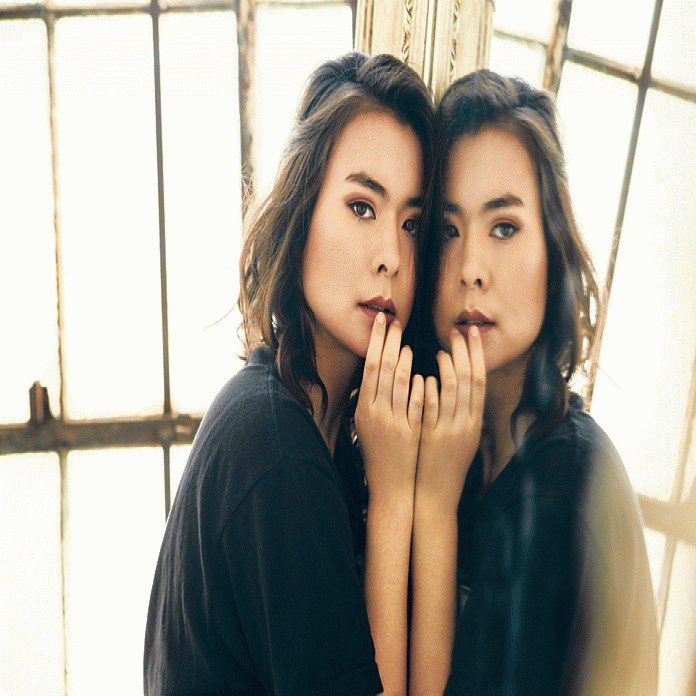
“It never occurred to me as a possibility,” she recalls. “I was always making up little phrases in my head and singing them to myself, or I would come up with little turns of phrase to entertain myself, but it never occurred to me that anything I made up would be important enough to be songs. A lot of my favorite artists, listening to them never made me make the connection between myself and them. I loved Mariah Carey, but I never thought, ‘I’m going to be the next Mariah Carey.’ I loved M.I.A. and I loved Björk, but it never turned into ‘I’m going to make their music.’ I think the process for me was more like, ‘I write music, I want to make music, and I have to figure out a way to do this, even though I don’t know how to.’ It wasn’t really example-driven.”
After graduating at 17, Mitski had the abundant free time that was necessary to start making a serious effort at developing her songcraft. This is, she admits, a somewhat late age to begin writing music, and though she developed quickly, musically she struggled to develop her voice as a writer. That wouldn’t come, she says, until she had to consider an audience, and she wouldn’t have that until she left the film program at Hunter College and enrolled in the Purchase College’s Conservatory of Music in Harrison, New York. It was there that she would perform her early compositions as part of her classwork, experiencing instant gratification for the first time. No longer content to simply use her songs as a safe place to emote, she now began to write from a more “objective” perspective, she says, and the songs came quickly. Her first effort, a 2012 self-released piano-based album called Lush, contained the seeds of many of the ideas that would blossom in her future work—the deeply felt exploration of characters, the raw vulnerability of the writing—and her classmates would notice.
“I think she was a little bit mysterious, because she didn’t hang out on the campus too much,” recalls Patrick Hyland, a younger classmate who would soon become Mitski’s producer and closest musical collaborator. “So, speaking just in the peer community of that school, there was something mythic that she had made this very mature sounding album and wasn’t with the in-crowd of the other bands that were popular at our school. People were very impressed by the sophistication on that record, even though it was made by a student.”
This sort of ambition was not uncommon for students at Purchase, Hyland says, though the seriousness and discipline with which Mitski approached her projects set her apart from her peers. Ask anyone what was driving her during these years of single-minded, almost desperate, determination, and they’ll answer the same way: Mitski had no other options. There was nothing else she wanted to do. There was no fallback plan.
During her studies, she would soak up as much as she could, asking to be written into classes outside of her major in order to prepare herself to successfully write and record music with as little outside help as possible. Even so, she would need help—a whole orchestra’s worth-when recording her second album, 2013’s Retired from Sad, New Career in Business. Not only did Mitski recruit players from the Purchase community to play strings, brass, and woodwinds, she would also film a video for each song on the album. As evidenced by the title—itself taken from an episode of The Simpsons—Mitski was now writing songs with theatrics and a darkly biting sense of humor, creating her own millennial opera.
“I was just floored with her work ethic and her ability to get things done,” says Peter Denenberg, head of the studio production and studio composition programs at Purchase. “Then once I started hearing the music, I remember on one occasion inviting her to come talk to get a sense of who she is and what she’s doing to see if I could help. But, frankly, she didn’t need any help,” he laughs. “She was already kicking ass and getting stuff done.” Through watching Mitski, Denenberg says he began to better understand exactly what a self-motivated independent artist needed to put herself in a position to succeed in the music industry, and he began to reshape the program as a result. “A lot of the changes in the curriculum and the [faculty] hirings and knocking down of walls, a lot of it was based on inspiration from Mitski,” he says.
Despite the scope of her ambition, Retired from Sad failed to resonate much outside of the campus. Upon graduation, she would relocate to Brooklyn, bounce from apartment to apartment while working long hours at dead-end jobs, and struggle with the realization that her previous life experiences had not prepared her to cultivate long-term relationships. Those frustrations would be channeled into 2015’s Bury Me at Makeout Creek, her first collection of songs that could be properly called a “rock album.” Shedding the eager-to-impress academic flourishes of her first two releases, Mitski picked up a guitar and raged. It was angry and urgent, full of roaring riffs and visceral imagery, the sound of someone tired of waiting. This time, there would be an audience.

Released on Double Double Whammy, the album received glowing reviews from national publications and pushed Mitski from the solo house shows that had been her main performance spaces into the indie club circuit. This much was not so surprising; Mitski and Hyland had believed that the album had commercial potential if it got past the right cultural gatekeepers. What was surprising was just how entrancing Mitski had become as a performer and how deeply the music seemed to be connecting with those who attended her shows.
“It’s the rarest of things,” says Phil Waldorf, who signed Mitski to his Dead Oceans label after seeing her perform at Glasslands Gallery in Brooklyn. “I have seen it only a couple times before. I remember seeing a band like Neutral Milk Hotel in the ‘90s, and the way people just felt this connection with the songs and the writing and the mystery and the persona—all that. I see a lot of that with Mitski. With her, it’s a little different because she’s not only connecting through songs and shows but through social media and this overarching message. It’s incredibly authentic. It’s something that you find an incredibly talented artist and you give the best advice you can [as a record label]. You’re kind of following their instincts, because their instincts are so good. That has always been in the case with Mitski.”
Now with some major promotional muscle behind her, Puberty 2, her fourth album in five years, would represent a breakthrough on an exponential level. Fans would tattoo her lyrics on their bodies. “Your Best American Girl,” an examination of being a mixed race woman in a relationship with a white American man, would be streamed nearly eight million times on Spotify. She would open for Pixies, whose quiet-loud dynamics were frequently mentioned as a reference point for her work, and she was anointed not only as an artist who had a way with an alt. rock hook but who had something to say.
“I think maybe she didn’t realize how much it would change her day to day life,” Hyland recalls. “The increased obligations and the mixed bag of experiences that you get from having a larger fanbase, of interacting online with the nicest people in the world and the worst people in the world, I think she didn’t realize how much attention there would be on herself as a person when the music started to get more attention.”
In a sense, her adolescence had been good training for living this sort of life. Being constantly on the move was excellent preparation for living on the road. But finally having an audience was more profound than that. As someone who grew up longing for something to believe in so strongly that she once joked she would probably have become a nun if she was raised Catholic, seeing her words being mouthed back to her night after night was a intensely reassuring experience. Some nights her fans cried during particularly emotionally charged moments in the show; some nights Mitski did, too. On stage every night, she found the place where she belonged.
“When people finally started to hear [my music], it was more a relief than anything,” she recalls. “I wasn’t surprised, because I had just pushed so hard for it. I think it really started to sink in when the tension became sustained, like, ‘What I’m saying is being understood by other people that I haven’t met.’ That sensation, in and of itself, is why I keep doing what I do. Just that very raw phenomenon of it being clear that something you feel is something other people feel. Just that sheer sense of connection, because in that moment you’re not alone. You’re just a normal human being. That’s what keeps me doing this—just constantly having it be reaffirmed that I’m normal and other people have felt the way I feel.”
Anything You Want to Give Me
When Mitski and Hyland were working on the songs that would become Be the Cowboy they had few clear directions but one obvious mandate: there would be no attempt to make Puberty 3. Specifically, that meant the distorted guitars that had dominated the previous two albums would be nudged to the side, and for the first time in her career Mitski went into a record without a clear sound in mind. This was an anxiety-ridden process, Mitski says, weighed down with the pressure to deliver an album worthy of the attention she had received. She had breakdowns in the studio, begging Hyland to make decisions for her. She deconstructed her old songwriting approaches and found what, if anything, was worth keeping. She obsessed over song mixes, second-guessing herself until the eleventh hour. The benefit of making an album with little more than gut instinct—then having that album succeed on every conceivable level—is that you can stop worrying about whether you can deliver under pressure. But that doesn’t mean Mitski can now relax.
“It’s really scary, because being in this cycle, you get really caught up in it,” she says. “Because everyone around you is getting more and more and more, and there’s this feeling that you have to progress to the next stage—do the bigger venues, do the better festivals. But I want to make sure that I’m making music because I want to make music. I want to make sure that’s the priority,” she says, trailing off in frustration. “I’m probably being very confusing, but it’s probably because I personally feel confused about it. I have to decide what is the point of it for me now and what I want out of it. It doesn’t feel like playing bigger venues is the point, but it’s also hard to turn it down when it’s in your grasp.”
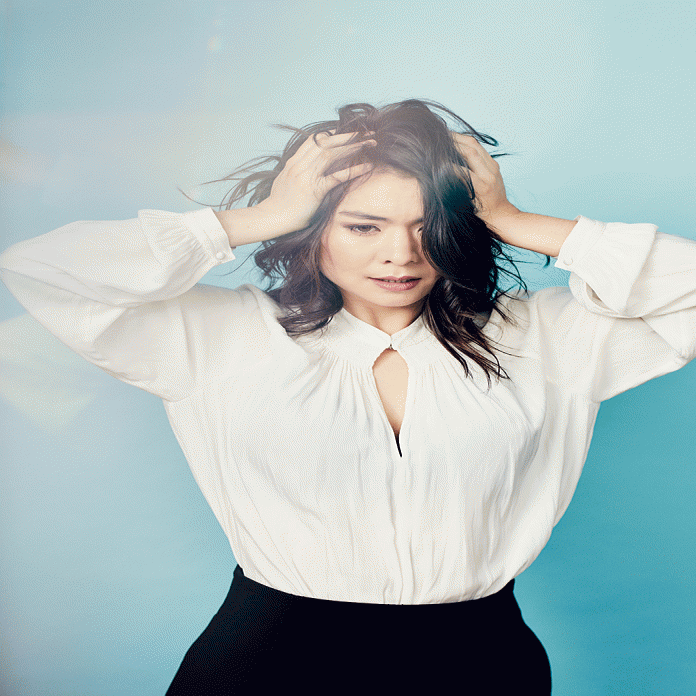
Having opened for Lorde during the North American leg of her Melodrama tour, Mitski has seen the view from the next step up the ladder. Though she was often performing to half empty stadiums of people finding their seats, the experience left an impression. There was something poetic about a large team of people coming together every day, each with a different role, to work together to pull off this massive stage production. Even so, she’s quick to admit that her most memorable experiences as a concertgoer have not come in stadiums, and she’s uncertain that the sense of intimacy that has defined her performances could be replicated in spaces meant for sporting events. But have you ever heard of an artist turning down a chance to play Madison Square Garden?
“I’m very wary of it affecting my art,” she admits, “because I’ve listened to so much music where you can tell the point of it was money, and there’s something so sad about it. I don’t want to create that kind of music, but I understand now how you get to that point, because you just get caught up in it until you just start making that music because it’s your job and you need to get that next paycheck. And I’m very afraid of that, because I’m such a gullible person and no better than anyone. I still have problems with my ego and have that thing where I need everyone to love me and need to be validated. It’s very scary—the thought that that will affect and maybe taint my music. I want to make sure that what I make is necessary and not frivolous.”
Such statements are commonplace among songwriters, even those whose music is defined by frivolity, but Mitski seems nothing if not sincere when she repeats them. There are exactly two moments during our conversation where she seems particularly flattered by something I’ve said about her music. The first is when I mention that her songwriting contains significantly more humor than she gets credit for, leading her to excitedly read me a recent text from a friend who made the same observation. The second comes when I suggest that part of her appeal as a lyricist is that she has such precise annunciation that every word is intelligible, and she quickly quotes a Twitter follower who similarly praised her diction and intonation. As the interview ends, she thanks me for “asking so many questions about my music,” as if this is not a common occurrence. It might be a cliché, but for Mitski the music really does come first.
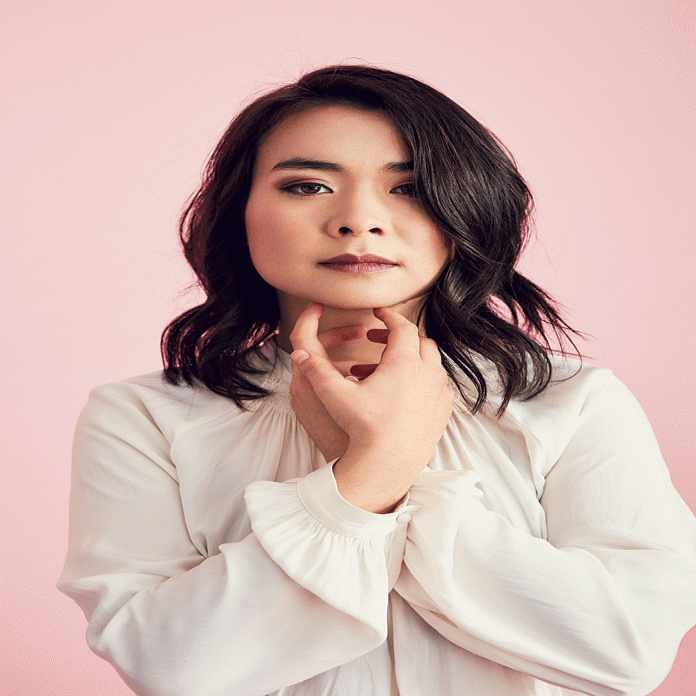
There is a resignation in her tone when she offers these comments, a kind of weariness that accompanies the realization that your persona is as much your product as your product is. For an intensely private person, this is a heavy burden to carry. “So much of my income is directly based on external validation, which is quite unhealthy,” she says. “I might, just to get away from it, get another job and take a break from music, not because I don’t want to make music anymore but just to have a sense of stability.”
That much is simple enough. The version of “stability” Mitski describes is modest: paying rent, being able to afford healthcare for herself and eventually for her parents, settling down in one place for a while. She remains, at heart, a practical person. But she also now finds herself in a position rife with impracticality, one where an intensely private person makes music for a public that demands more and more from her, where an artist whose desire to connect with listeners has resulted in her wrapping herself in characters to retain some sense of privacy. If her music was a means to an end, what will keep her going after she has gotten everything she wanted?
“It might just be ego,” she says with no trace of irony. “It might just be that I want to make a connection. I want to be known. I want to reach people. I want to be bigger than I am. I don’t mean famous; I mean I want my existence to matter. I want to be recognized so that my life doesn’t just disappear when I die. And that sort of thought process drove in the direction of ‘Okay, how do I make something that is understood? How do I make something that people actually care about, that might mean something to someone other than myself?’ I think that’s what drove me to keep refining my craft as a songwriter,” she says, pausing to reflect if for only this moment. “Just wanting to matter.”
[Note: This article originally appeared in Issue 65 of Under the Radar’s print magazine, which is out now. It was our front cover story. This is its debut online.]
Support Under the Radar on Patreon.
Current Issue

Issue #72
Apr 19, 2024 Issue #72 - The ‘90s Issue with The Cardigans and Thurston Moore
Most Recent
- Under the Radar Announces The ’90s Issue with The Cardigans and Thurston Moore on the Covers (News) — The Cardigans, Thurston Moore, Sonic Youth, Garbage, The Cranberries, Pavement, Lisa Loeb, Supergrass, Spiritualized, Lush, Miki Berenyi, Miki Berenyi Trio, Emma Anderson, Hatchie, Ride, Slowdive, Velocity Girl, Penelope Spheeris, Terry Gilliam, Gus Van Sant, Ron Underwood, Kula Shaker, Salad, Foals, Semisonic, The Boo Radleys, Stereo MC’s, Pale Saints, Blonde Redhead, Sleater-Kinney, Cocteau Twins, Lucy Dacus, Alex Lahey, Horsegirl, Grandaddy, alt-J, Squid, The Natvral, Wolf Alice, Jess Williamson, Sunflower Bean, Orville Peck, Joel McHale
- 10 Best Songs of the Week: Fontaines D.C., Cassandra Jenkins, Loma, John Grant, and More (News) — Songs of the Week, Fontaines D.C., Cassandra Jenkins, Loma, John Grant, Good Looks, Hana Vu, Belle and Sebastian, Yannis & The Yaw, Strand of Oaks, Home Counties
- Fresh Shares New EP ‘Merch Girl’ (News) — Fresh
- Premiere: LOVECOLOR Shares New Video for “Crazy Love” (News) — LOVECOLOR
- Final Summer (Review) — Cloud Nothings

Comments
Submit your comment
June 30th 2019
2:27pm
i upvote this, similar stuff here https://www.usavibez.com/read-news/